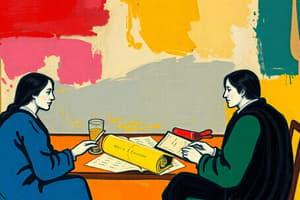Podcast
Questions and Answers
Which of the following literary periods saw the rise of Arthurian legends and romances?
Which of the following literary periods saw the rise of Arthurian legends and romances?
- Old English
- Renaissance
- Romanticism
- Middle English (correct)
Which author is associated with the Renaissance period in English literature?
Which author is associated with the Renaissance period in English literature?
- John Dryden
- Geoffrey Chaucer
- William Shakespeare (correct)
- William Wordsworth
What was the primary focus of the Romanticism period in English literature?
What was the primary focus of the Romanticism period in English literature?
- Emphasis on emotion, imagination, and the individual (correct)
- Satire and realistic fiction
- Realism and social commentary
- Exploration of themes such as love, power, and mortality
Who is a notable author of the Victorian Era in English literature?
Who is a notable author of the Victorian Era in English literature?
What was the primary characteristic of the Modernism period in English literature?
What was the primary characteristic of the Modernism period in English literature?
What was the primary influence on Old English literature?
What was the primary influence on Old English literature?
What literary movement emerged in the 18th century and is characterized by themes of horror, mystery, and the supernatural?
What literary movement emerged in the 18th century and is characterized by themes of horror, mystery, and the supernatural?
Which literary device involves the use of language to create vivid sensory experiences?
Which literary device involves the use of language to create vivid sensory experiences?
What is the term for the use of objects, colors, or other elements to represent abstract ideas or concepts?
What is the term for the use of objects, colors, or other elements to represent abstract ideas or concepts?
Which literary device involves a contrast between what is expected and what actually occurs?
Which literary device involves a contrast between what is expected and what actually occurs?
Which literary movement explores the consequences of scientific and technological advancements?
Which literary movement explores the consequences of scientific and technological advancements?
Flashcards are hidden until you start studying
Study Notes
Major Periods in English Literature
- Old English (c. 450-1100):
- Characterized by Anglo-Saxon literature, such as Beowulf and Caedmon's Hymn
- Influenced by Germanic and Christian traditions
- Middle English (c. 1100-1500):
- Saw the rise of Arthurian legends and romances
- Notable works include Sir Gawain and the Green Knight and Geoffrey Chaucer's Canterbury Tales
- Renaissance (c. 1500-1660):
- Marked by the emergence of William Shakespeare and Christopher Marlowe
- Exploration of themes such as love, power, and mortality
- Restoration and 18th Century (c. 1660-1800):
- Characterized by the rise of realistic fiction and satire
- Notable authors include John Dryden, Alexander Pope, and Jonathan Swift
- Romanticism (c. 1800-1840):
- Emphasized emotion, imagination, and the individual
- Key authors include William Wordsworth, Samuel Taylor Coleridge, and Lord Byron
- Victorian Era (c. 1840-1900):
- Saw the rise of realism and social commentary
- Notable authors include Charles Dickens, the Brontë sisters, and Thomas Hardy
- Modernism (c. 1900-1945):
- Characterized by experimentation with form and style
- Key authors include James Joyce, Virginia Woolf, and T.S. Eliot
Notable Literary Movements and Genres
- Gothic Fiction:
- Emerged in the 18th century
- Characterized by themes of horror, mystery, and the supernatural
- Science Fiction:
- Emerged in the 19th century
- Explores the consequences of scientific and technological advancements
- Postcolonial Literature:
- Emerged in the mid-20th century
- Explores the experiences of colonized peoples and the legacy of colonialism
Key Literary Devices and Terms
- Alliteration:
- The repetition of initial consonant sounds in words
- Imagery:
- The use of language to create vivid sensory experiences
- Symbolism:
- The use of objects, colors, or other elements to represent abstract ideas or concepts
- Irony:
- A contrast between what is expected and what actually occurs
- Foreshadowing:
- The use of hints or clues to suggest future events or plot developments
Major Periods in English Literature
- Old English (c. 450-1100): Characterized by Anglo-Saxon literature, influenced by Germanic and Christian traditions, featuring works like Beowulf and Caedmon's Hymn.
- Middle English (c. 1100-1500): Saw the rise of Arthurian legends and romances, notable works include Sir Gawain and the Green Knight and Geoffrey Chaucer's Canterbury Tales.
- Renaissance (c. 1500-1660): Emergence of William Shakespeare and Christopher Marlowe, exploration of themes like love, power, and mortality.
- Restoration and 18th Century (c. 1660-1800): Characterized by the rise of realistic fiction and satire, notable authors include John Dryden, Alexander Pope, and Jonathan Swift.
- Romanticism (c. 1800-1840): Emphasized emotion, imagination, and the individual, key authors include William Wordsworth, Samuel Taylor Coleridge, and Lord Byron.
- Victorian Era (c. 1840-1900): Saw the rise of realism and social commentary, notable authors include Charles Dickens, the Brontë sisters, and Thomas Hardy.
- Modernism (c. 1900-1945): Characterized by experimentation with form and style, key authors include James Joyce, Virginia Woolf, and T.S.Eliot.
Notable Literary Movements and Genres
- Gothic Fiction: Emerged in the 18th century, characterized by themes of horror, mystery, and the supernatural.
- Science Fiction: Emerged in the 19th century, explores the consequences of scientific and technological advancements.
- Postcolonial Literature: Emerged in the mid-20th century, explores the experiences of colonized peoples and the legacy of colonialism.
Key Literary Devices and Terms
- Alliteration: The repetition of initial consonant sounds in words.
- Imagery: The use of language to create vivid sensory experiences.
- Symbolism: The use of objects, colors, or other elements to represent abstract ideas or concepts.
- Irony: A contrast between what is expected and what actually occurs.
- Foreshadowing: The use of hints or clues to suggest future events or plot developments.
Studying That Suits You
Use AI to generate personalized quizzes and flashcards to suit your learning preferences.




